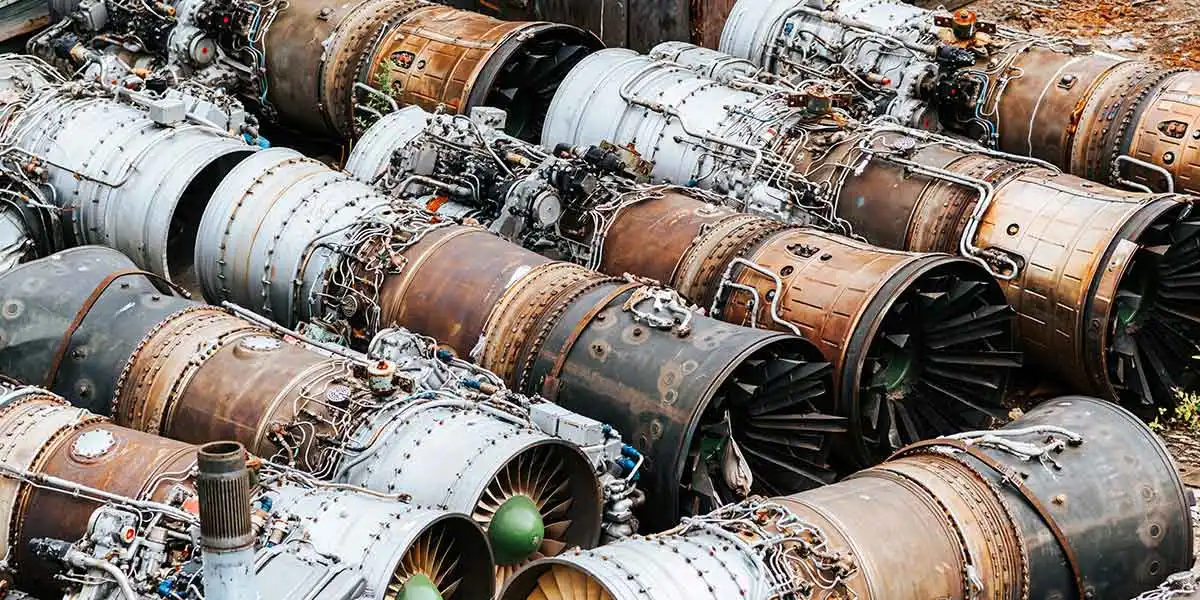

JAN 03, 2025
Are you eager to learn more recycling scrap jet engine parts, or looking for reputable scrap metal buyers in McDonough, GA to handle these materials? If so, RCM Recycling is the go-to service provider. We leverage extensive expertise and proven strategies to provide environmentally friendly jet and turbine recycling service. By recycling salvageable materials from old or damaged engines, we play a vital role in reducing the carbon footprint of aerospace scrap. Unlike other scrap metal recycling facilities, we follow industry practices to ensure safety throughout the scrap management process. The last thing you want is to violate FAA standards for resale parts, resulting in costly fines and penalties.
Scrap jet engine recycling refers to the process of reclaiming valuable components and materials from old or unused jet engines. Jet engines are made from high-quality materials such as titanium, aluminum, and rare earth metals, which are repurposed for new technologies. Professional scrap metal recycling ensures these materials are reused, reducing the need for cutting down on waste or mining. In addition, some parts of the engine can be refurbished and resold, contributing to a circular economy.
The main benefit of recycling jet engines is the positive environmental impact. Jet engines contain materials that can cause environmental damage when disposed of improperly. By recycling these materials, you reduce these harmful waste, and the need for new raw materials. A good example is titanium, a material commonly used in jet engines that requires a lot of energy to extract and refine. Recycling jet engines reduces the carbon footprint required to produce these metals. In addition, recycling diverts scrap material from landfills, cutting down on pollution significantly.
Scrap jet engine recycling has substantial economic benefits. The process of dismantling and reusing parts of jet engines creates jobs in the recycling and aviation sectors. Skilled labor is required to deconstruct the engines carefully, identify reusable components, and ensure that valuable materials are extracted without damaging them. Recycled materials, such as metals, are often sold to manufacturers, where they are used to creating new products, stimulating the economy. By recovering these materials, airlines and manufacturers can reduce the cost of purchasing new components, saving money in the long run.
Recycling a scrap jet engine is a meticulous and detailed process that involves several crucial steps. Once the engine is disassembled, the technicians remove large components such as the turbine blades, compressor sections, and casing. Next, valuable metals are separated. Titanium, aluminum, and nickel alloys are extracted for resale. Other parts of the engine, like the turbine blades, may be refurbished and reused.
Lastly, any remaining waste is carefully processed and disposed of environmentally responsibly. The entire process requires follows strict safety and environmental regulations to ensure efficient and sustainable recycling efforts.
Scrap jet engine recycling is an essential practice that plays a pivotal role in sustainability efforts within the aviation industry. By recovering valuable materials, reducing waste, and minimizing environmental impact, jet engine recycling provides significant benefits. While challenges exist, continued advancements in recycling technology and processes make it a more effective and vital part of the aviation sector’s future. Contact us at RCM Recycling and schedule a consultation with reputable and seasoned scrap metal buyers. As the demand for sustainable practices grows, jet engine recycling will remain a vital component in shaping a greener and more resource-efficient industry.